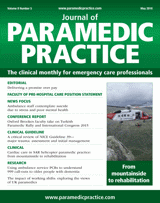References
The impact of working shifts: exploring the views of UK paramedics
Abstract
There is limited research within the UK investigating the effects of shift work on paramedics. Paramedics have relatively high rates of sickness levels and there are links between shift work and health. This study explores UK paramedics’ perceptions of the impact of working shifts.
Methods:
Exploratory qualitative research was utilised to investigate the perceptions of UK paramedics on the impacts of working shifts. Two focus groups were completed involving 11 paramedics. The transcriptions were analysed using thematic analysis.
Results:
Paramedics described factors associated with working shifts that mirror research already completed within different occupations: effects on physical health, fatigue, family life, safety and performance; but paramedics additionally described factors that are more limited to working in the paramedic profession such as a broader range of psychological stressors and organisational factors. The theme of psychological health was a wider theme that went beyond shift work and encompassed the overall paramedic role and the unique and stressful nature of the work.
Conclusions:
This research has allowed an insight into the perceived effects of shift work on UK paramedics and exposes the challenges paramedics face in their working environment. There is a suggested link between the relatively high rates of sickness and the effects of shift work and paramedics’ overall working environment. Further exploration and recognition of the effects of shift work on UK paramedics is recommended.
There is a link between working shifts and physical and poor psychological health and wellbeing (Harrington, 2001; Vogel et al, 2012). Between September 2010 and September 2012, United Kingdom (UK) ambulance staff had the highest aggregated sickness rates by National Health Service (NHS) staff group at a level of 6.2%. All NHS staff groups saw their sickness levels rise during the same period (Health and Social Care Information Centre, 2013).
NHS leaders have committed to improving workplace culture and ensuring staff health and wellbeing is part of performance measurement. Leaders support the challenge to promote healthy lifestyles and prevent ill health among the NHS workforce and recognise that staff health is linked to productivity and performance (NHS Employers, 2013). The Boorman Report (2009) set out recommendations to improve NHS staff health and wellbeing and recognise the link to organisational performance. The state pension age for paramedics is increasing to 68 years in 2046 following government changes in 2011 (Unison, 2016).
Subscribe to get full access to the Journal of Paramedic Practice
Thank you for visiting the Journal of Paramedic Practice and reading our archive of expert clinical content. If you would like to read more from the only journal dedicated to those working in emergency care, you can start your subscription today for just £48.
What's included
-
CPD Focus
-
Develop your career
-
Stay informed

